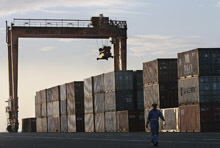
Typical street scene in Santa Ana, El Salvador. (Photo: iStock)
IMF Survey: Emerging Markets Fill New Role Amid Financial Strains
August 22, 2008
Emerging markets have become key drivers of global growth, acting as stabilizers over the past year when advanced economies were hit by fallout from the subprime mortgage crisis, IMF Chief Economist Simon Johnson says in the September 2008 issue of Finance & Development.

Containers in Djibouti: South-south trade (not involving advanced economies) has proved resilient, IMF's Johnson says (photo: Marco Longari/AFP/Getty Images)
FINANCIAL TURBULENCE
Noting that emerging markets have grown fast during the past 10 years, Johnson says they have sustained this growth in the face of substantial financial turbulence in advanced economies during the past 12 months, for three main reasons.
First, although emerging markets are highly connected to the world in terms of trade in goods, they are not (yet) fully connected in terms of financial flows. Thus emerging markets were generally not exposed to any significant degree to the problems in U.S. subprime mortgages or associated financial instruments.
Fiscal caution
Second, emerging markets have continued to maintain sound economic polices. Unlike during some previous booms, they did not throw fiscal caution to the wind. And problematic behaviors, such as various forms of rent-seeking or corruption, seem to have been controlled much more effectively in this boom compared with past booms.
Third, global trade remains strong and so-called south-south trade (not involving advanced economies) has proved resilient. Countries understand that throwing up trade barriers should be avoided at all costs. The global trading rules have held up so far under considerable pressure. This has been of great benefit to emerging markets.
"As a result, over the past year, it is emerging markets that have played a relatively stabilizing role, helping to offset repeated waves of financial concern (and even capital flight from entire classes of securities) in advanced economies. This is a reversal of the usual roles; it is also the first time in recorded history that emerging markets have played such a role," Johnson writes.
The next crisis
Johnson asks what any new kind of potential crisis lurking for emerging markets might look like. Most likely it would be centered again on a failure to control inflation, except through raising interest rates late and in dramatic fashion. This might coincide with a broader global slowdown that would affect trade. The danger is that emerging markets could now be perfectly positioned for negative experiences very much akin to those seen in richer countries during the 1970s.
Luckily, Johnson says, drastic negative outcomes are avoidable, particularly if key emerging markets act quickly to slow down their economies and—most important—move to allow more exchange flexibility, which will allow them to run independent monetary policies appropriate for their own conditions.
■ Read the full article in Finance & Development.
Comments on this article should be sent to imfsurvey@imf.org







